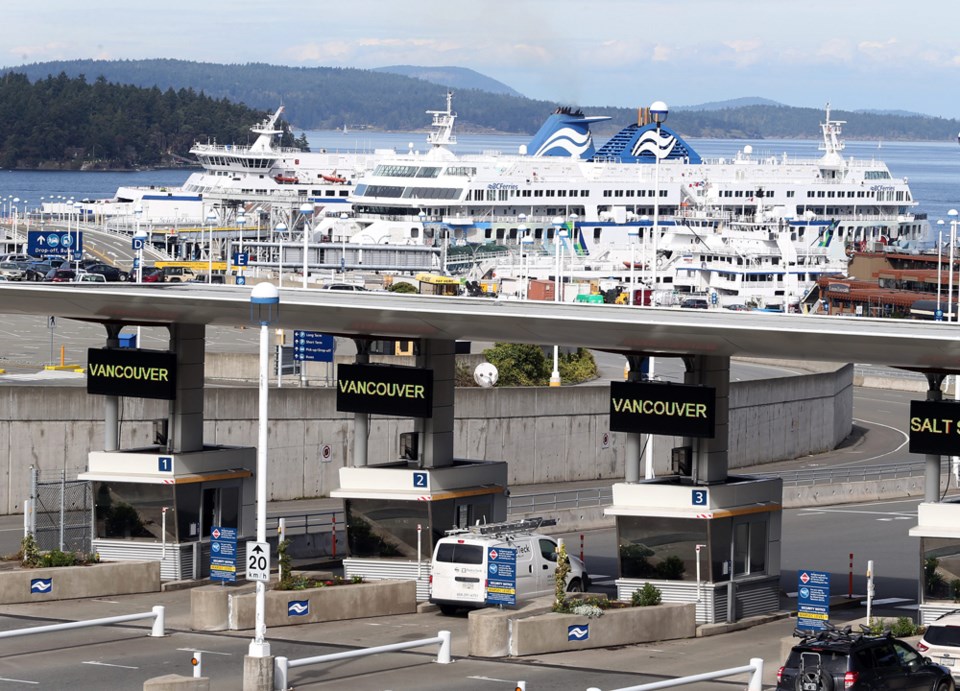B.C. Ferries will receive federal financial assistance, but the corporation’s long-term stability will only be secure once it is brought back into government, says the interim leader of the B.C. Greens.
Federal Environment Minister Jonathan Wilkinson and B.C. Transportation Minister Claire Trevena will announce today that B.C. Ferries is eligible for the same matching federal and provincial financial assistance already earmarked for B.C. Transit and TransLink.
The money is designed to help public transit agencies recover some of the operating revenue lost because of COVID-19.
The funding would end weeks of private appeals to Ottawa by Premier John Horgan and top B.C. officials that B.C. Ferries be given federal transit bailout funds under Ottawa’s Safe Restart program. The two governments have set aside $1.2 billion in matching funds for transit aid.
B.C. Ferries has lost $130 million in expected revenue since the pandemic started in March due to a sharp decline in ridership, the elimination of numerous sailings and travel restrictions recommended by health officials. The corporation has said its financial situation is dire and it is only continuing to operate by increasing its debt and deferring plans to upgrade terminals and ships.
Even if Ottawa offers financial aid, there needs to be a better long-term solution for B.C. Ferries to give coastal residents confidence the system can survive emergencies like the pandemic, said Adam Olsen, the interim Green leader and MLA for Saanich North and the Islands, whose riding includes numerous ferry-dependent Gulf Islands.
Olsen said the government should bring B.C. Ferries into the Ministry of Transportation and fund it as a core marine highway system — something Trevena proposed while in Opposition but has not done since becoming transportation minister.
“It would be part of the government operations, so rather than saying those guys [at B.C. Ferries] over there have to figure it out, the onus would be on the government to ensure that that system is provided the services it needs now, but also has the resources in place to be able to improve the service,” Olsen said.
“I think it would be the responsibility of the government to deliver the transportation network that our province and economy requires.”
Olsen said it was bad news that B.C. Ferries has put off upgrades.
“Those capital investment programs are very important to ensure the longevity and the future of the ferry system,” he said. “We might be saving ourselves an expense now, but it is going to come back to haunt us. This situation is going to create a long-term problem.”
If government won’t return B.C. Ferries to the ministry, it could consider making it a full-fledged Crown corporation, Olsen said.
The province provides $200 million annually to B.C. Ferries. It added $180,000 in COVID-19 financial relief during the pandemic to temporarily stave off cuts to 11 smaller coastal routes.
B.C. Ferries used to be inside government, but was spun off in 2003 as a private corporation with a single share, owned by the province. It meant B.C. Ferries’ debt, $1.4 billion, is not counted on the B.C. government’s books.
Trevena was not available for an interview Monday but said in a statement that while there have been complications as a result of the pseudo-private structure of B.C. Ferries, the province has still managed to reduce fares by 15 per cent and resume discounts for seniors.
One-third of B.C.’s economy is connected by the ferry service and COVID-19 has exposed how fragile that system is, said Olsen.
“I think the core of what I’m saying here is, it is our responsibility,” said Olsen. “To just brush it off as something that a semi-corporate entity is going to take care of, or the federal government is going to step in and bail out … a point that is at the core of my constituents is that people want to feel that we are taking responsibility for this.”



